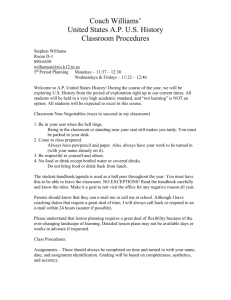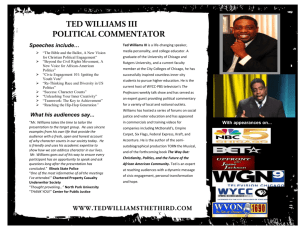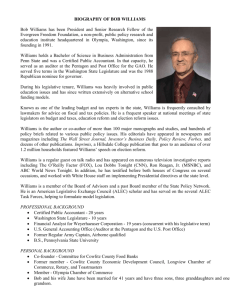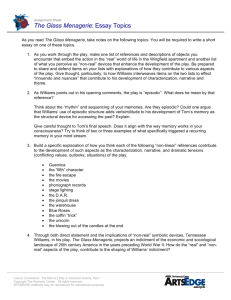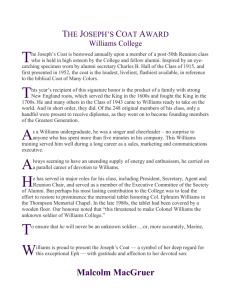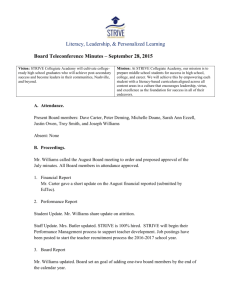Additional Tips
advertisement
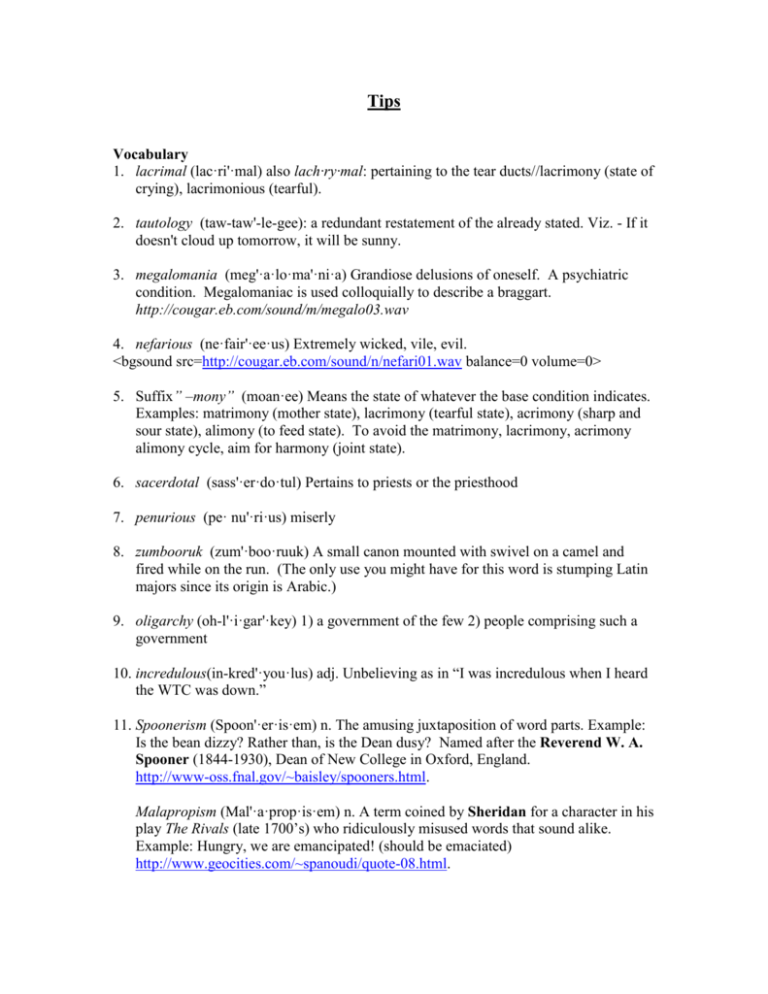
Tips Vocabulary 1. lacrimal (lac·ri'·mal) also lach·ry·mal: pertaining to the tear ducts//lacrimony (state of crying), lacrimonious (tearful). 2. tautology (taw-taw'-le-gee): a redundant restatement of the already stated. Viz. - If it doesn't cloud up tomorrow, it will be sunny. 3. megalomania (meg'·a·lo·ma'·ni·a) Grandiose delusions of oneself. A psychiatric condition. Megalomaniac is used colloquially to describe a braggart. http://cougar.eb.com/sound/m/megalo03.wav 4. nefarious (ne·fair'·ee·us) Extremely wicked, vile, evil. <bgsound src=http://cougar.eb.com/sound/n/nefari01.wav balance=0 volume=0> 5. Suffix” –mony” (moan·ee) Means the state of whatever the base condition indicates. Examples: matrimony (mother state), lacrimony (tearful state), acrimony (sharp and sour state), alimony (to feed state). To avoid the matrimony, lacrimony, acrimony alimony cycle, aim for harmony (joint state). 6. sacerdotal (sass'·er·do·tul) Pertains to priests or the priesthood 7. penurious (pe· nu'·ri·us) miserly 8. zumbooruk (zum'·boo·ruuk) A small canon mounted with swivel on a camel and fired while on the run. (The only use you might have for this word is stumping Latin majors since its origin is Arabic.) 9. oligarchy (oh-l'·i·gar'·key) 1) a government of the few 2) people comprising such a government 10. incredulous(in-kred'·you·lus) adj. Unbelieving as in “I was incredulous when I heard the WTC was down.” 11. Spoonerism (Spoon'·er·is·em) n. The amusing juxtaposition of word parts. Example: Is the bean dizzy? Rather than, is the Dean dusy? Named after the Reverend W. A. Spooner (1844-1930), Dean of New College in Oxford, England. http://www-oss.fnal.gov/~baisley/spooners.html. Malapropism (Mal'·a·prop·is·em) n. A term coined by Sheridan for a character in his play The Rivals (late 1700’s) who ridiculously misused words that sound alike. Example: Hungry, we are emancipated! (should be emaciated) http://www.geocities.com/~spanoudi/quote-08.html. Communication 1. Avoid saying, "different than." Say," different from." 2. Do not say, "single most." Say," most." "Most" is superlative meaning only one. Consequently, there is no need for "single." "Single most" may sound impressive but is really irritating verbosity. Were it not so, we should hear at times, "many most," "several most," or "a few most." There are exceedingly rare situations when "single" and "--est" are needed in tandem. Example, "It is the biggest single weekend event." In this case “single” modifies the type of event - "a single weekend event" - as opposed to a "two-weekend event," and it was the biggest such event. 3. Avoid using the word "schizophrenic" unless you mean separation between reality and perception. Too often people use this word incorrectly when they are trying to describe dual personality. Over a million people in the United States suffer from schizophrenia with onset typically around age 25. Medication effects range from miraculous to disappointing. Do not inadvertently offend the many who directly and indirectly are affected by this serious ailment by using "schizophrenic" when you mean "duality." Dr. Jeckle and Mr. Hyde were dual personalities. In contrast, a schizophrenic might look at a billboard and see a non-existent personal message to them as well as hear voices that are not real. The cause is thought to be incorrect chemical process kinetics at the brain synapses. 4. Avoid the phrase "the fact that." It means nothing 99.99% of the time. Leave it out. A TV commentator recently epitomized this bit of syntactical nonsense by saying, “What about the fact that bin Laden might possibly be in Pakistan”? Some fact! She should have said, “What about the possibility that bin Laden is in Pakistan”? 5. Do not use "hopefully" unless you are certain you know what "hopefully" modifies. Ninety-nine times out of 100 "hopefully" modifies an inanimate noun. For example: "Hopefully, the car will start," means the car is hopeful! What is meant is, "I hope the car will start." Get in the habit of saying "I hope" and let inanimate object remain unemotional. The last thing anyone needs is an angry toaster or a depressed car in the morning. How do, "Depressed, the car could not start" and "Torqued, the toaster burned my toast" strike you? 6. Do not say, “--- one of the only.” Only means one. Only originally came from “oneness.” It is fine to say, “- - -one of the few.” 7. Do not use redundant extremes such as very excellent, very unique, very superior, far left extremist. Simply say excellent, unique, superior, left extremist since excellent implies very; unique is one of a kind; superior is the best; and a left extremist is far left. 8. The use of “and” does not change the pronoun case. It would be an unusual adult that would be caught saying, “Me went to the night club.” Yet, we often hear young adults say, “Me and Jim went to the night club.” Is this cute, or what? Answer: “what.” There are two errors here: 1) put yourself last and 2) use the correct pronoun case, namely, “I.” Try it without the “and:” I went to the night club. Now, put yourself last: voila – Jim and I went to the night club. The same concept may be used for this incorrect sentence: “John built the icehouse for Jim and I.” Really, now, would anyone ever say, “John built the icehouse for I.” Voila - John built the icehouse for me. Warning: do not expect people in high positions or places to be pronoun-case role models with any consistency. You will hear professors, congressman, senators, presidents, ministers, etcetera routinely make these errors. Remember, “and” does not change pronoun case. Try forming the sentence without the “and” and it will help you get it right. 9. Many people say "less" when they should say "fewer." Use "fewer" when referring to things you can count. Use "less" on things you cannot count. Examples: I had fewer vacation days last year. I had less fun last year. You can count days but not fun. There is only one chain store in the USA your instructor has found that says, “.. or fewer items" at their express check out lane. Can you find it on your travels? 10. Avoid redundant phrases such as I was thinking in my mind. Where else would one be thinking. I smelled this odor with my nose. It was clearly obvious. Clearly means obvious. It was incredibly unbelievable. Incredible means unbelievable. The frigid air was really cold. Oh, really! 11. Do not say “have went” but “have gone.” This misuse is so common as to be nearly a colloquialism in the region. Have is a helping verb and takes only the past participle which for the verb go is gone. If you do not hear at least three “have wents” a day in SD, you are not listening. 12. Much of what one hears on television is offered as valuable analysis but is really mindless chatter to fill airtime. Many of these comments are nothing but a tautological web of seeming wisdom. It means nothing. Examples from actual comments broadcast on television and reproduced here as accurately as memory provides: The weather tomorrow should be clear and warm unless it clouds up or that northern cold front moves into the region. If it does not rain, we can expect a nice dry day for the parade. (There will be weather.) I think the team using the hydraulic ram has a distinct advantage but hydraulics can be unreliable. The wrecking ball team has simplicity on their side but their platform may not be massive enough. So, unless the hydraulic team has hydraulic problems they will win the competition but if they do then the wrecking ball team will win unless they have platform problems. (Either team could win.) It is true that candidate Williams did not win the primary since he got fewer votes than both Matthews and Smith but he did pretty well. While third is not quite as good as second it is better than fourth. If he had done just a little better he could have been above Smith who came in second so that being so close Williams did pretty well. On the other hand, in all fairness, we must realize that if Williams had received fewer votes than Jones he could have come in behind the fourth place Jones who would then be third which would then move Williams into fourth – somewhat of an improved position compared to fifth so Williams continues to look pretty strong. However, all in all, we must give credit to Matthews for being ahead of second place Smith to win the primary. It should be pointed out that Matthews not only got more votes than Smith but he also got more votes than either Williams or Jones. (Primary results: Matthews, Smith, Williams, Jones. I will refer to my statistician any questions about the meaning of first, second, third, and fourth since that is apparently pretty complicated.) My President (Ford), are there going to be any more revelations of things not currently known by you? Sam (Donaldson), to the best of my knowledge there is nothing I am currently unaware of. (I don’t know) On the occasion of explaining Ford’s Pardon of Nixon. 13. Speak plainly. Avoid complexity when simplicity serves as well. Viz. – replace prioritize with rank and prior to with before.

